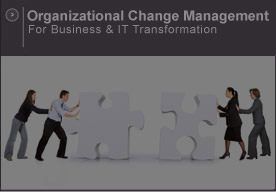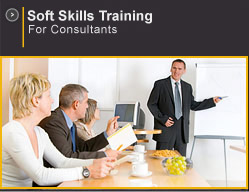Training Modules
 In addition to OTA’s curriculum of standard courses, our education offering extends to a series of training modules that offer the possibility of customizing a seminar to an organization’s specific needs.
In addition to OTA’s curriculum of standard courses, our education offering extends to a series of training modules that offer the possibility of customizing a seminar to an organization’s specific needs.
Each training module represents a half day of training time. We can easily combine as many training modules as needed in order to assemble a seminar tailored to your needs.
Following is a list of existing training modules. Click on the Training Module title to see a brief description. OTA can also develop custom training modules to meet specific training requirements.
For a complete description of the modules or to order a customized Training Seminar, contact info@ota.ca.
OTA Training Modules:
- Situational Leadership for IT Consultants
- Managing Customer Expectations
- Managing Virtual Teams
- Dealing with Difficult Customers
- Making Presentations to Management
- Selling Services: Sales Tips for Consultants
- The Art of Negotiation: Tips & Tricks
- Managing Partner Relationships
- Assertive and Confident Communication
- Consultant Survival Skills
- Understanding & Dealing with Resistance
- Stakeholder Analysis & Coalition Building
Training Modules Descriptions
Situational Leadership for IT Consultants
This workshop introduces tools and techniques that managers can leverage to face common ‘people management’ challenges. The Ken Blanchard Situational Leadership (SLII) self assessment kit is used as a framework that provides opportunities to enhance communication, diagnosis and flexibility skills. Because it opens up communications, SLII is especially effective when working with knowledge workers, whether they be colleagues, subordinates or customers.
Topics:
- Your ‘people management’ challenges
- The abilities of a situational leader
- Assessing your natural leadership style
- Diagnosis development levels
- Choosing the right leadership style
- Role plays
Managing Customer Expectations
Managing customer expectations is a complex competency that draws on many fundamental consulting skills. For IT consultants, it typically involves the ability to articulate value, effective requirements documentation, project change request management, mapping stakeholder concerns, objection handling, establishing trust and effective probing/listening skills. Furthermore, expectations management is often a team-based activity, requiring consistent behaviors and messaging from the consulting team. This module explores best practices and provides opportunities for participants to share lessons learned.
Topics:
- Expectations management: a cause and effect analysis
- A process and checklist when initiating an engagement
- A review of objection handling techniques
- When and how to say “No”
- Case study exercise
Managing Virtual Teams
High-performance project teams share the same traits: commitment to common goals, strong identity, willingness to share information and high morale. This presentation will introduce best practices that help you form teams when team members are separated by geography, culture and time zones. You’ll learn about the challenges and the resources available for cross cultural communication and collaboration technology.
Topics:
- Discussion: virtual team challenges
- Your role in team formation
- Best practices from the field and from research
- Leveraging resources for cross-cultural communication
- Using collaboration technology (virtual collaboration rooms, document management systems, Webex, instant messaging, etc.)
- Why E-mail is not enough
Dealing with Difficult Customers
Learn how to deal with difficult customers. Being an external consultant is hard, but so is being a customer sometimes! This module covers some common “difficult customer behaviors” and introduces techniques to re-establish rapport. Video examples highlight typical disruptive behaviors as well as effective ways of dealing with them. Learn what triggers difficult behaviour, and share your most challenging customer situations.
Topics:
- Team exercise: Voting for your most challenging customer behaviour
- Understanding what triggers difficult behavior
- 10 types of difficult behavior
- Dealing with the “bully”
- Workshop (Role Plays): Selected participants have to deal with a difficult customer
Making Presentations to Management
Presentations to executives and senior managers differ from those made to project team members. This session will help participants understand executive expectations and define effective ways of delivering executive briefings. You’ll learn what executives and senior managers care about, the messaging and presentation strategies that work (and those that don’t), as well as a process for structuring executive presentations.
Topics:
- What executives and seniors managers care about
- Messaging and presentation strategies that work (and those that don’t)...
- A process for structuring executive presentations
- Workshop: Teams of participants are given brief case studies and must then prepare to deliver an “executive briefing” to the group
Selling Services: Sales Tips for Consultants
On-site consultants are ideally positioned to identify additional opportunities to sell services that provide real value to their customers. Find out how you can qualify opportunities and lay the groundwork for your sales colleagues, while maintaining the trust of your customers.
Topics:
- Understanding and leveraging your ‘Trusted Advisor’ status with your customer
- Common up-selling and cross-selling opportunities in professional services or software
- Framing the opportunity around your customer’s tactical and consequential pains
- Establishing a common language with your sales colleagues
- Team Workshops: Applying the tactical/consequential pain model to common customer situations
The Art of Negotiation: Tips & Tricks
Negotiation skills are pivotal in many consulting activities: gaining stakeholder commitment, obtaining resources, and setting (or resetting) expectations.
This session introduces simple techniques for analyzing, planning and negotiating win-win outcomes. You’ll learn how to define your bottom line, how to analyze stakeholders and their needs, and what common mistakes to avoid.
Topics:
- Exercise: What is it you want… and often don’t get?
- Defining your bottom line
- Analyzing stakeholders and their needs / wants
- How to frame your demand and avoiding common mistakes
- Research findings: what the winners do and the skills/attitudes they develop
- Role plays: Common consulting negotiation situations
Managing Partner Relationships
Establishing and maintaining productive relationships with consultants of other consulting firms can be a challenge. Learn what you can do to prevent conflicts and ensure that both the customer and the partner achieve their goals. You’ll learn the common sources of friction, how to initiate a conversation about ground rules that prevent conflict, and tactics for handling delicate situations.
Topics:
- Differentiating between partner and customer/supplier relationships
- Common sources of friction between consultants from different firms
- Initiating a conversation around ground rules to prevent conflicts
- How to frame your demand
- Avoiding common mistakes
- 8 levels of consulting purposes: where do you position yourself? ... And your partner?
- Exercise/real-life simulations: Participants have to come up with the best strategy and tactics for handling delicate situations
Assertive and Confident Communication
To communicate assertively is to express yourself openly, confidently and honestly, without denying the opinions of others. But how do you do it when deadlines are tight and you’re surrounded by opinionated, stressed, and potentially hostile customers and colleagues? This session proposes a simple way to pull back, gain control of the situation and break the cycle of defensiveness.
Topics:
- Assertive vs. aggressive communication
- Calculate your assertiveness quotient
- When it’s ok to be assertive
- Video examples of assertive and defensive communication
- The 5 skills of assertive & confident communication
- Team exercise: Giving effective feedback in common project situations
Consultant Survival Skills
Survival skills are fundamental in establishing and maintaining productive relationships with customers, colleagues and partners.
Participants have an opportunity to learn and practice these techniques as well as share their experiences in their usage. Handouts and quick reference cards ensure portability of these skills.
Topics:
- Roles of the IT & Business Consultant
- The art of positioning yourself and setting/managing expectations
- Effective probing & questioning
- Saying ‘No’ and ‘I don’t know’ professionally
- Delivering bad news: Process & simulation
- Avoiding unproductive confrontations
- The ‘Trusted Advisor’: Going beyond the slogan and applying the Trust Equation (Suggested handout: David Maister’s book: ‘Trusted Advisor’)
Understanding and Dealing with Resistance
Being an outside consultant typically forces you into a role of change agent, and real change will naturally meet with some resistance. Understanding the natural process and dynamics of resistance and learning to anticipate its manifestations will make you a more effective consultant, while reducing your stress level!
Topics:
- Helping people move up the adoption curve
- Natural reactions to change, and why objections can be a good sign
- Differentiating between overt and covert resistance
- The three (3) ‘R’ Skills: Recognize, Rephrase & Research
- Exercise: Defusing aggressive resistance
Stakeholder Analysis and Coalition Building
‘In a fight between you and the world, bet on the world’ (F. Kafka).
Without the ability to foster a coalition of stakeholders, even the best solution will never be implemented. This training module provides a framework to help participants navigate the political realities of modern organizations.
Topics:
- Common misconceptions about organizational politics
- Reading the power structure of an organization
- Stakeholder analysis techniques
- Power bases and network analysis
- Interacting with executives
- Fostering ownership of your proposed solution


